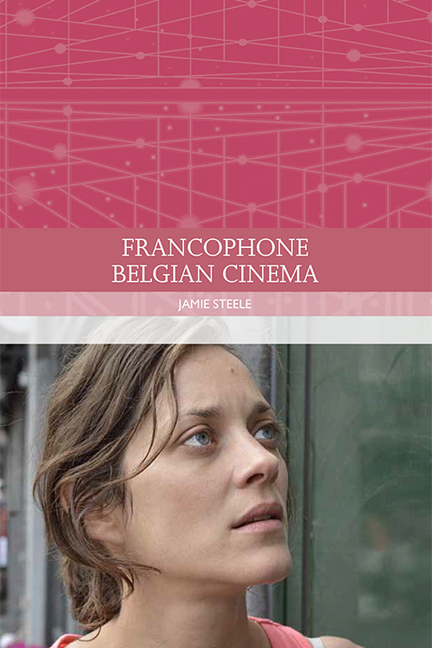Book contents
- Frontmatter
- Contents
- List of Figures
- Acknowledgements
- Traditions in World Cinema
- Introduction: Regional/National/Transnational Debates in Francophone Belgian Cinema
- 1 The (Francophone) Belgian Film Ecosystem: Trends in Production, Distribution and Exhibition
- 2 ‘No Future’: Social Marginalisation, Social Precariousness and Depictions of Seraing in Le gamin au vélo (Jean-Pierre and Luc Dardenne, 2011) and Deux jours, une nuit (Jean-Pierre and Luc Dardenne, 2014)
- 3 ‘Stills’ and Fragmented Families: Contemplating the Private Sphere in Joachim Lafosse’s Wallonia
- 4 From Slag Heaps to Cliffs: The ‘Marked’ Regional Landscape in Cages (Olivier Masset-Depasse, 2006)
- 5 The Francophone Belgian Road Movie: Eldorado (Bouli Lanners, 2008) and Ultranova (Bouli Lanners, 2005)
- 6 Lucas Belvaux’s Return: The Thriller Genre and Heists in Liège
- Conclusion
- Works Cited
- Films Cited
- Index
6 - Lucas Belvaux’s Return: The Thriller Genre and Heists in Liège
Published online by Cambridge University Press: 29 April 2021
- Frontmatter
- Contents
- List of Figures
- Acknowledgements
- Traditions in World Cinema
- Introduction: Regional/National/Transnational Debates in Francophone Belgian Cinema
- 1 The (Francophone) Belgian Film Ecosystem: Trends in Production, Distribution and Exhibition
- 2 ‘No Future’: Social Marginalisation, Social Precariousness and Depictions of Seraing in Le gamin au vélo (Jean-Pierre and Luc Dardenne, 2011) and Deux jours, une nuit (Jean-Pierre and Luc Dardenne, 2014)
- 3 ‘Stills’ and Fragmented Families: Contemplating the Private Sphere in Joachim Lafosse’s Wallonia
- 4 From Slag Heaps to Cliffs: The ‘Marked’ Regional Landscape in Cages (Olivier Masset-Depasse, 2006)
- 5 The Francophone Belgian Road Movie: Eldorado (Bouli Lanners, 2008) and Ultranova (Bouli Lanners, 2005)
- 6 Lucas Belvaux’s Return: The Thriller Genre and Heists in Liège
- Conclusion
- Works Cited
- Films Cited
- Index
Summary
This chapter considers a second filmmaker, in the shape of Lucas Belvaux, who draws significantly on pre-established codes and conventions developed in distinct genres. The filmmaker has floated between different genres throughout his career. This is most notably the case for the France-based trilogy – Après la vie/After Life (Lucas Belvaux, 2002), Cavale/On the Run (Lucas Belvaux, 2002) and Un couple épatant/An Amazing Couple (Lucas Belvaux, 2002) – in which each film corresponded to a different genre. As a result, the attempt to weave three interlinked and interlocking narratives with the same characters imbricates both genre and film authorship. The trilogy's English-language publicity material evinces the turn to auteurism, describing the films as examples of ‘staggering virtuosity’ (EXE BD 63400 2017). Such a discursive interpretation of the trilogy articulates a potential for Belvaux's adherence to Sarris’ oft-discussed third concentric circle of the ambiguous and maligned ‘interior meaning’ that identifies an auteur (Sarris 1962: 453). The trilogy may not be quite as ‘unparalleled’ as the publicity material immediately posits, since the film experiment recalls the work of Krzysztof Kieślowski (the Dekalog (1989) series for Polish television) and Alain Resnais (Poirson-Dechonne 2011: 22) or even ‘network narratives’ (Bordwell 2006) by contemporaneous filmmakers such as Alejandro González Iñárritu.
On the basis of his own experiential engagement with French film production, Belvaux contends that genre films, with a strong history and identity (such as comedies and polars) are more likely to be successfully funded in France (Ghennam and Hélié 2010: 149). For instance, Belvaux discusses his second film Pour rire! (Lucas Belvaux, 1996) as an example that draws ‘a priori’ on the codes and conventions of the comedy genre (ibid.). This intentionality is clearly evidenced by the film's title. It is also predicated on pragmatic decisions made by the filmmaker to guarantee funding and gain the confidence of film producers after the commercial failure of his first film, Parfois trop d’amour (‘Sometimes there's too much love’; Lucas Belvaux, 1992) (Duculot 1997: 33). Excluding Belvaux's four made-for-television movies, political and crime thrillers populate his films most, with 38 témoins/One Night (2012), Rapt (2009), La raison du plus faible/The Right of the Weakest (2006), and Cavale (2002) being the most prominent. This is closely followed by romantic comedies in the form of Pas son genre/Not My Type (2014), Un couple épatant and Parfois trop d’amour and pure comedy with Pour rire!.
- Type
- Chapter
- Information
- Francophone Belgian Cinema , pp. 155 - 177Publisher: Edinburgh University PressPrint publication year: 2018



